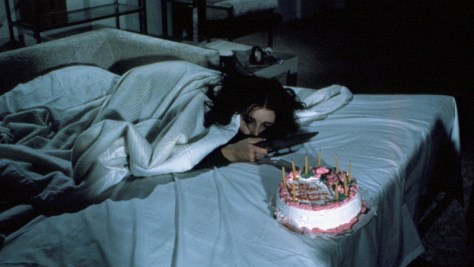
Format: Cinema
Seen at TIFF 2015
Director: Osgood ‘Oz’ Perkins
Writer: Osgood ‘Oz’ Perkins
Cast: Emma Roberts, Kiernan Shipka, Lucy Boynton, James Remar, Lauren Holly
USA, Canada 2015
93 mins
*** out of *****
The prolific character actor Oz Perkins makes his promising directorial debut with this creepy, atmospheric and surprisingly affecting blend of psychological thriller and outright horror. Most importantly, February not only signals the arrival of a formidable filmmaking talent, but is a picture that takes its rightful place within an important pedigree of scarefests, which harkens back to the golden age of RKO’s horror unit in the 40s.
The childhood fear of dark corners, in addition to feelings of both loneliness and abandonment, always seem to make for the happiest of bedfellows in genre cinema – happy for viewers, however, not so much for the protagonists of said films. For me, the grandfather of all such work is Val Lewton’s alternately chilling and deeply moving 1944 classic The Curse of the Cat People (directed by Gunther von Fritsch and Robert Wise, written by the indomitable DeWitt Bodeen). That highly influential RKO masterpiece saw the ghost of Irena (Simone Simon) return from the Jacques Tourneur-directed and Bodeen-scribed Cat People (1943) to act as a spiritual guide, playmate and protector for Amy (Ann Carter), the daughter of Irena’s former lover. Utilizing an ‘imaginary’ playmate and nods to Charles Dickens’s “Great Expectations” allowed for a horror film that worked on both visceral and emotionally dramatic levels.
February treads similar territory in a wholly contemporary context. Following the mysterious journey of Joan (Emma Roberts), a furtive, seemingly eidolic, yet determined young lady who makes her way across a New England landscape of blood, ice and snow, we become all-too aware that her destination is a place of gothic bumps in the night and a genuinely malevolent force. The place in question is an old, isolated, high-end girls’ boarding school, which has been closed for its winter break and appears to house only Kat (Kiernan Shipka) and Rose (Lucy Boynton), two young ladies who are stranded there when their respective parents do not arrive to pick them up.
A storm appears to be brewing – not simply of the meteorological kind, but of the supernatural kind as well. At first Rose, the eldest, bitterly rejects being placed in the role of protector and ignores Kat. Gradually Rose’s protective instinct kicks in as the long, dark night wears on. Alas, she finds herself desperately powerless as a truly insidious force overcomes Kat and increases in ferocity. Occasionally cross-cutting with Joan, it seems that the evil in this dark, old school is ever-swelling as she nears her ultimate destination.
A convergence is clearly in the cards and it’s not rocket science to guess that it might not at all be pretty. Where things do go a bit awry on my own disappoint-o-meter is that the fine combination of visceral and cerebral chills were of the ‘I hope things don’t go here’ variety during the denouement. A fine screenplay buoys so much of the film’s evocative directorial style, plus the genuinely terrific performances, but once again, I find myself up against a wrap-up I’d expect from a much lesser work.
I doubt this will bother most, but as a psychopath who sees way too many movies, it troubled me to no end. That said, on my baser levels of critical assessment, the movie offers three babes, a creepy old house and a malevolent possession all within a sumptuously crafted indie feature, so what the hell am I complaining about?
Greg Klymkiw


